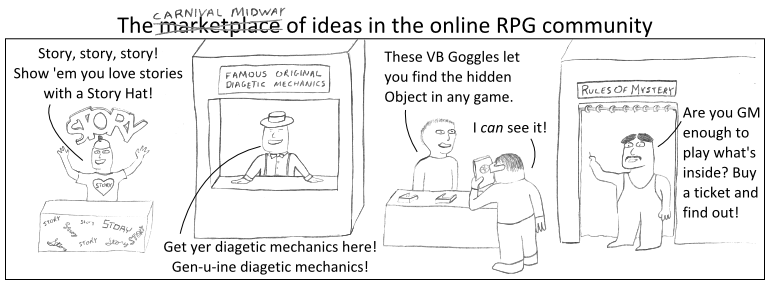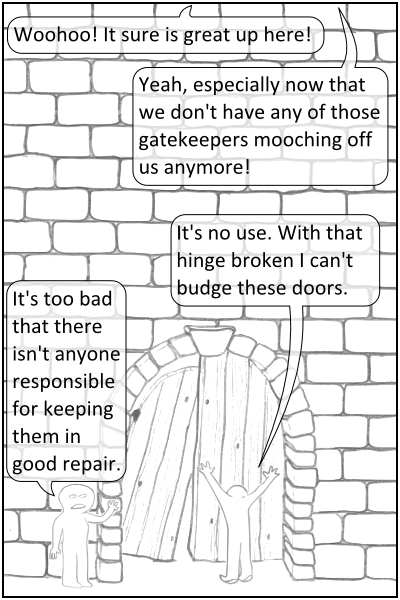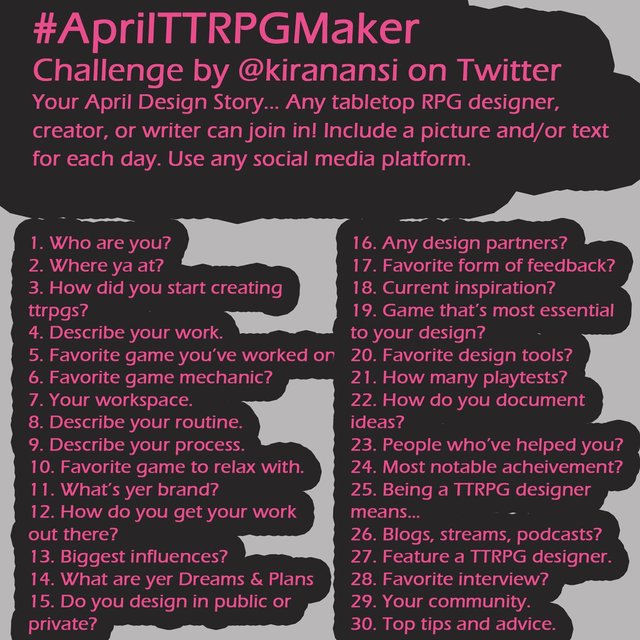The #AprilTTRPGMaker activity day 12 question asks: “How do you get your work out there?” Like several other people, I think the most accurate answer for me is “I don't.” As with a lot of things nowadays, I don't think the “marketing environment” for indie RPGs is very healthy.

The “attention economy” may not be working very well
Humans are a lot better at tracking relationships than we are at evaluating quality. It's almost always a safer bet to like something created by someone who's already well-known for creating good stuff than it is to stick your neck out to claim some new discovery is good, that risks your reputation as someone with good taste. Even if you are someone who's inclined to take that risk you run up against Sturgeon's Law: ninety percent of everything is crap, which means it takes a lot of work to find good stuff. And for multiple reasons, including the Dunning-Kruger effect, you can't usefully rely on a creator's assessment of their own work to judge its quality. Maybe they're trying to “fake it till they make it”, maybe they're suffering from impostor syndrome, maybe they don't have a good frame of reference of what else is out there and don't know where their work should fit on the spectrum even if they could objectively evaluate it. For good or ill we live in a gatekeeperless world, but I don't think we've quite cracked the mechanism for how to use crowdsourcing to discover quality in a way that doesn't descend into bubbles, cliquishness, cronyism, or other weird social dynamics.

My preference would be to work on product quality before worrying about marketing
The best marketing starts from a good product. In an ideal world if you had a good game it would nearly sell itself, you wouldn't have to worry about “getting it out there”. I don't think game design is a “solved” problem – getting games that work at all is still a relatively difficult task, let alone games that work reliably and/or deliver exactly the experience you want. In general, the best way to get better at something is to practice it. I think the best practice tends to happen when you can take a process all the way from the beginning to the end. Most of my projects are stalled because I need things like playtesting to get all the way to the end. The conventional wisdom is that you need to do some marketing to attract attention to convince people to test things for you. But that circles back to the beginning: if the game hasn't been playtested then the best marketing is unavailable to you (i.e. honest reports about how good the product is), so we're forced to use less effective means, like building hype for the high concept or elevator pitch. But everybody else is doing that, too, so a lot of it just gets lost in noise.
The #AprilTTRPGMaker questions

(image from Kira Magrann's twitter)
You say is true. But baseline. You could ha r the most amazing game out there, and not havr anyone notice. It's a double edged sword really. Your appealing to a clique within another clique. It's like we have done I the film industry. Or maybe not at all, but we have formed a distribution tunnel. Where we put content in, gain some reputation. Do alot of work for free. And keep getting more gigs as a result. Building more momentum as we go, and developing a strong team. And always being open to suggestions. Maybe this isn't much like your gaming system. But hopefully it helps a bit.
Downvoting a post can decrease pending rewards and make it less visible. Common reasons:
Submit